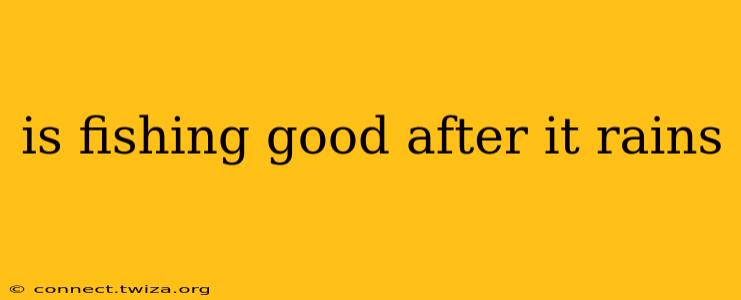Rain can significantly impact fishing conditions, making it a crucial factor for anglers to consider. While some assume rain automatically means poor fishing, the reality is much more nuanced. The effect of rain on fishing success depends on several factors, and understanding these factors can help you determine whether post-rain fishing will be fruitful.
Does Rain Always Make Fishing Worse?
No, rain doesn't always make fishing worse. In fact, in many cases, a rain shower can actually improve fishing conditions. The key lies in understanding how the rain affects the water and the fish's behavior.
How Does Rain Affect Fishing?
Several factors influence how rain impacts fishing:
-
Increased Water Levels: Rainfall increases water levels in rivers and streams, creating more habitat for fish and potentially flushing out stagnant areas. This can lead to fish becoming more active as they move into newly accessible areas. However, excessively high water levels can also make fishing difficult or unsafe.
-
Turbidity: Rain can make the water murkier, reducing visibility. This can benefit certain fish species that rely on ambush tactics, while others that rely on sight-feeding might be less successful.
-
Water Temperature: Rainfall can also change water temperature. A sudden drop in temperature can make fish less active, while a slight increase might stimulate feeding. The impact depends on the initial water temperature and the intensity and duration of the rain.
-
Oxygen Levels: Heavy rains can sometimes reduce oxygen levels in the water, especially in slow-moving or stagnant bodies of water. This can negatively impact fish health and activity.
-
Increased Food Sources: Rain can wash insects and other food sources into the water, creating a feeding frenzy for fish. This is particularly true for species that feed on surface insects.
What Type of Fish Bite Better After Rain?
Different fish species react differently to rain. Generally, fish that prefer murky water or rely on ambush tactics tend to do well after rain. Examples include:
- Bass: Often become more active after rain, particularly largemouth bass. The increased turbidity helps them ambush prey.
- Catfish: Typically thrive in slightly muddy water and are often more active after rainfall.
- Trout: Can be impacted differently depending on the intensity and duration of the rain. Moderate rain might improve fishing, while heavy rain could negatively impact oxygen levels.
When is the Best Time to Fish After Rain?
The best time to fish after rain depends on several factors, including the intensity and duration of the rain, the type of water body, and the species you're targeting. However, here are some general guidelines:
-
Moderate Rain: Fishing can often be good within a few hours after a moderate rain shower, especially if it's followed by sunshine. The increased food sources and slightly elevated water levels can entice fish to feed.
-
Heavy Rain: It's best to wait until the water clears up a bit before fishing after heavy rain. The increased turbidity and potential oxygen depletion can make fishing difficult.
What Kind of Bait Works Best After It Rains?
The best bait after rain will vary depending on the water clarity and the species you are targeting. However, here are some general suggestions:
- Cloudy Water: Use darker-colored lures or bait that is easily detected in low visibility.
- Clear Water (after light rain): More natural-looking baits might be effective.
How Long Does it Take for Fishing to Improve After Rain?
The time it takes for fishing to improve after rain varies greatly. A light shower might have a minimal impact, with fishing improving almost immediately. Heavy rain, however, might require several hours or even days for the water to clear and the fish to become more active. The size of the water body also plays a role; smaller streams and ponds will typically clear faster than larger lakes or rivers.
In conclusion, while rain can sometimes negatively affect fishing, it often presents excellent opportunities. By understanding how different rainfall patterns affect the water and fish behavior, anglers can significantly increase their chances of success. Remember to prioritize safety and always check weather reports before heading out.
